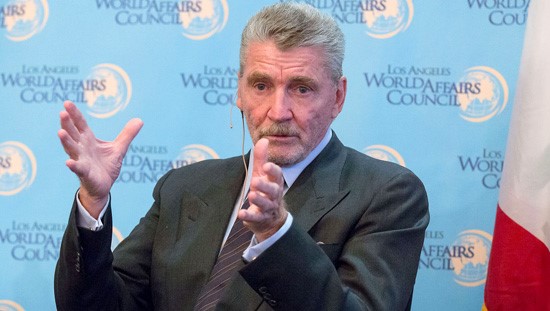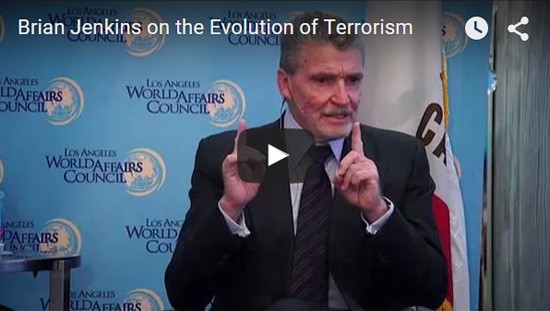 Brian Jenkins, senior adviser to the President of RAND Corporation, speaking at the Council
Brian Jenkins, senior adviser to the President of RAND Corporation, speaking at the CouncilTerrorists have become more violent and lethal over the past four decades because many are now motivated by religious absolutism and not by political objectives, according to Brian Jenkins. Now a senior adviser to the President of RAND Corporation, Jenkins looked back over his 43 years of studying terrorism at a dinner with LAWAC on Thursday, September 25 with the benefit of chastened hindsight. He admitted he missed some emerging trends, including the importance of the Internet to terrorist networks, but above all he cautioned Americans from overreacting to a terrorist threat that, in the years following 9/11, have killed only a handful of Americans in this country every year.
Some of the developments in terrorism - nerve gas attacks on the Tokyo subway, airplanes flown into buildings - were so unexpected that nobody could have seen them coming. "Were I to have actually outlined what would take place in the subsequent 40 years, no one would have believed me," said Jenkins. "RAND would have dispatched me over to Hollywood to write film scripts." But at the same time terrorists did not do some of the things that U.S. policy makers worried about most, like biological and nuclear terrorism. "Not that they didn't try - al Qaeda tried to get nuclear materials, but they failed."
Jenkins is widely regarded as one of the top terrorism experts in the world, and frequently briefs the U.S. government and other entities. On the list of what he got wrong, Jenkins candidly admits that he misjudged "what weapons they would use - we were looking all the time at weapon development - what would replace the AK 47 automatic rifle?" By looking at surface to air missiles and other high-tech weaponry, Jenkins missed the biggest evolution. "And I should have spotted this earlier, because it came from what I had been saying that terrorism is about communication, about manipulating their audience, it is not about battles against armies." That big innovation was the Internet, which allowed terrorists to spread propaganda, to create online communities of supporters and all kinds of virtual organizations." Meanwhile the actual weapons have changed very little - the two gunmen who attacked Charlie Hebdo magazine in Paris in January, the third gunman who shot up a Jewish supermarket, and the gunman who began shooting at passengers on a French train in August before being taken down by three Americans and a Briton - all were armed with AK 47s.
It is true, Jenkins conceded, that in some - rare - occasions, terrorism works. "Terrorists have been able to create and manipulate fear," said Jenkins. "They have been able to spread widespread destruction." Terrorists have won tactical concessions, and in some instances they have achieved major political gains, like in Northern Ireland, where terrorists from the IRA forced the British government to negotiate and bring them into the political system. But perhaps the biggest victory for terrorists overall: "They changed us a great deal, and in that sense terrorism has worked." Every time we go through security at an airport we are reminded of how much our lives have been changed by terrorists.
One of the biggest changes in terrorism over the past four decades has been the religious radicalization of various movements. In the 1970's groups like the IRA would call in warnings minutes before impending bomb attacks so that people could run outside - today al Qaeda or ISIS make no effort to issue warnings to spare human life. "It is a question of constituencies - in the 1970's they had operational constraints and moral considerations." For example, the IRA got considerable financial support from private U.S. citizens, and they feared that indiscriminate killing would lead to a decline in contributions from the U.S. "But when we moved into the 1980s, terrorism was more and more driven by ideologies based upon religious beliefs." This meant the terrorists no longer felt they had to answer to their contributors or supporters, "they only had to answer to God - and anyone who wasn't on their side was going to burn in hell anyway."
As for the U.S. response to terrorism, one major turning point was the 1983 bombing of the U.S. Marine Corps barracks in Beirut that killed 242 people, and the subsequent debate about how the U.S. should respond. "This was a huge debate in the policy community," said Jenkins. Some, led by Secretary of State George Shultz, argued that the U.S. needed to strike back or our diplomacy would be undercut. "Shultz said the U.S. cannot take punches forever." But the military, which had come out of a searing experience in Vietnam, feared getting into another quagmire, and wanted nothing to do with it. "The notion that the military was enthused about war on terrorism, even up until after 9/11, is just not true." Ultimately Shultz's camp prevailed, and President Reagan signed a National Security Directive in 1984 that authorized the use of military force against terrorist aggression. "Now, think how far we've come since then," said Jenkins. "We will use military force against terrorist organizations that attack us. We will use military force to bring down governments that give asylum or support terrorist groups that attack us," he said. "We will carry out pre-emptive attacks if we think terrorists are preparing to attack us... There's not a hell of a lot we won't do now."
In 1987, Jenkins wrote a memorandum for RAND listing 10 reasons why the U.S. should not use assassination as a tool in protecting national security. He raised moral, legal and practical objections to the practice. But today, as the U.S. carries out targeted killings of terrorists with drone attacks, Jenkins says that his position has shifted. "Now we are engaged in a form of war against al Qaeda and its offspring - in that context, killing of enemy commanders is legitimate." He cited the deliberate shooting down by the U.S. of Japanese Admiral Isoroku Yamamoto's plane in 1943, killing the man who was the architect of the Pearl Harbor attack - "and that decision went all the way to the President." Jenkins said that targeted killings against al Qaeda have to be used with the utmost care, as there is a probability of collateral casualties. "But it has been effective in degrading the capability of our foes...In these circumstances I can grit my teeth and say okay."
However Jenkins made it clear he was categorically against torture, saying this is one issue where he is on the same page as Senator John McCain. "In my view torture is never justified," Jenkins said. "It's just an absolute. You cannot do it...Torture doesn't belong in the repertoire of this country." He said that whatever information we might gain would be offset by the "cost we would pay in our own values" and argued that often it gets in the way of real intelligence. "You can always force people to talk - and most of what you get is pure rubbish." Jenkins also made the point that once people engage in it they have to say it works, even if it doesn't - "because then they have turned themselves into beasts for nothing."
When asked about the effectiveness of social media by ISIS and other groups, Jenkins said that because of the generation of the people involved, ISIS may be producing some 90,000 tweets a day. "But they're tweets," he said, to a room of laughter. "Let's not mistake the noise for a threat." In fact he said social media often allowed individuals to play at jihad in front of their computer, "and then close the screen and go out for a beer," rather than actually follow through with some action. As a recruiting tool in the U.S. it has not been terribly effective - "they are getting a person here and a person there," but no huge flow of recruits. On the positive side, he said it is a rich source of intelligence and he wouldn't shut it down, "we do listen to social media and we watch it very closely."
Nuclear terrorism, Jenkins said, is something that we have been worried about since the 1960s. "I don't know that it's inevitable," he said, but conceded that our risk has increased as nuclear weapons have become more widespread. But should the worst happen and a terrorist detonate a nuclear device, "a post-nuclear terrorism world would look very different." The U.S. would be much quicker to resort to extreme methods of retaliation, notably against any rogue nation with nuclear capabilities. "Iran would have about 15 minutes to persuade us it wasn't them otherwise we might not give a damn." Jenkins said it took about 30 days from the assassination of the Archduke Ferdinand in Sarajevo for fighting to break out in what became World War I. "In the case of a nuclear blast, I would give it about 30 hours."

